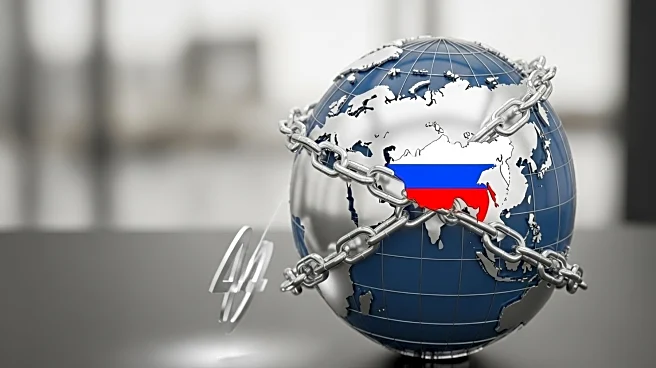What's Happening?
President Trump has indicated his readiness to initiate a second phase of sanctions against Russia, marking a potential escalation in the U.S. response to the ongoing conflict in Ukraine. This development follows a series of threats from Trump to impose further sanctions on Moscow, although he has previously refrained from doing so in hopes of facilitating peace talks. During a recent interaction at the White House, Trump confirmed his willingness to proceed with additional sanctions but did not provide specific details on what these measures might entail. The President's frustration with the lack of progress in ending the conflict, which he had initially hoped to resolve swiftly upon taking office, is evident. The White House has not yet commented on the specifics of the potential sanctions. Treasury Secretary Scott Bessent has suggested that the U.S. and the European Union could impose secondary tariffs on countries purchasing Russian oil, aiming to pressure the Russian economy and bring President Vladimir Putin to the negotiating table.
Why It's Important?
The potential escalation of sanctions by the U.S. could have significant implications for international relations and the global economy. If implemented, these measures could further strain U.S.-Russia relations and impact global energy markets, particularly affecting countries that rely on Russian energy exports, such as India and China. The move could also influence the geopolitical landscape, as increased economic pressure on Russia might alter its strategic calculations in the Ukraine conflict. For the U.S., this step represents a critical juncture in its foreign policy approach, balancing the need to support Ukraine while managing the broader implications of heightened tensions with Russia. The outcome of these actions could affect global economic stability and the diplomatic dynamics among major world powers.
What's Next?
Should President Trump proceed with the second phase of sanctions, the international community will closely monitor the response from Russia and its allies. The potential for secondary tariffs on countries buying Russian oil could lead to diplomatic tensions with nations like China and India, who are significant consumers of Russian energy. Additionally, the effectiveness of these sanctions in compelling Russia to negotiate could shape future U.S. foreign policy strategies. Stakeholders, including European allies and global energy markets, will be keenly observing the developments to assess the broader economic and political impacts.










